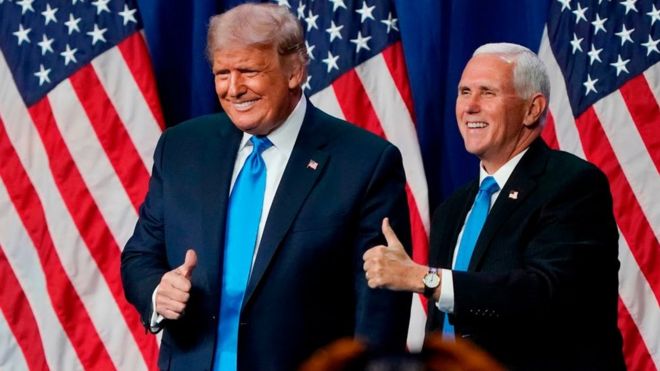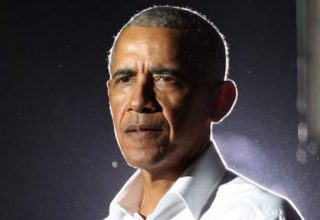
Just weeks away from the presidential election, Donald Trump has tested positive for coronavirus.
It throws up a host of questions about what might happen next.
Which campaign events will the president miss?
Mr Trump is required to go into self-isolation for 10 days from receiving his positive Covid test on 1 October, so he may still be able to take part in the next presidential debate, scheduled for 15 October.
A rally due to take place in Florida on Friday has been scrapped. The president will instead have a “phone call on COVID-19 support to vulnerable seniors”, according to the White House.
Mr Trump has other rallies scheduled during this period, which will now have to be cancelled or postponed.
Under what circumstances could the election be delayed?
President Trump’s period of self-isolation clearly has an impact on his ability to campaign.
So the question has been raised as to whether the election could be delayed, and how this might happen.
The US presidential election is held by law on the Tuesday after the first Monday of November, every four years – so this year it’s on 3 November.
Changing the date would be up to US lawmakers, and not the president.
It would require a majority of them in both Houses of Congress to vote in favour of any change of date. That is unlikely, given that it would have to pass through the Democratic-controlled House of Representatives.

Even if it were changed, the US constitution rules that a presidential administration only lasts for four years. So, President Trump’s term will automatically expire at noon on 20 January, 2021.
Changing this date would require an amendment to the constitution. This would have to be approved by two-thirds of US lawmakers or state-level legislatures, then three-quarters of US states – which is, again, unlikely.
What would happen if President Trump became incapacitated?
For now, President Trump is reported to have “mild symptoms”, but if he did become too ill to carry out his duties, this is what the US constitution sets out:
The 25th Amendment allows a president to hand over power to the vice-president, which means Mike Pence would become acting president. Once fit again, Mr Trump could reclaim his position.

If the president was too unwell to hand over power, the cabinet and vice-president could declare him unable to continue, and Mr Pence would assume the role.
If Mr Pence became incapacitated as well, under the Presidential Succession Act Nancy Pelosi, the speaker of the House of Representatives – a Democrat – would be next in line, although constitutional experts say such a transfer of power would prompt legal battles.
If she were unwilling or unable to take on the role, it would be handed to a senior Republican Senator, currently the 87-year-old Charles E Grassley. This too would almost certainly face legal challenges.
Has a president been incapacitated before?
In 1985, when President Ronald Reagan was in hospital for cancer surgery, he placed his vice-president, George HW Bush, in charge.
In 2002 and 2007, President George W Bush did the same with his vice-president when he was sedated during routine colonoscopies.
If Trump were unable stand for election, whose name would go on the ballot?
If, for whatever reason, a candidate chosen by a party as their presidential candidate is unable to fulfil that role, there are clear procedures that would come into play.
Although Vice-President Mike Pence would initially assume presidential duties, he would not necessarily become the Republican party’s election candidate – as they have already officially nominated Mr Trump.
Under the party’s rules, the 168 members of the Republic National Committee (RNC) would vote to elect a new presidential nominee, with Mike Pence as one of the likely candidates.
If Mr Pence were chosen, a new running mate would then have to be selected.
Neither the Democrats nor the Republicans have ever replaced their presidential nominee after officially selecting them.

What about early votes?
This would throw up a lot of uncertainties, say experts, as millions of postal votes have already been sent out with the names of the candidates nominated by their parties.
Early in-person voting has also begun in some states.
Voting would probably go ahead with the name of the incapacitated candidate still on the ballots, writes Rick Hasen, a professor of law at the University of California, Irvine.
But there would be questions about whether state laws allow the people nominated to cast votes in the US electoral college – called presidential electors – to vote for the replacement candidate.
What about changing the name of the candidate, if one withdraws?
“President Trump will almost certainly remain on the ballot, no matter what happens,” writes Richard Pildes, a law professor with expertise in elections.
He points out in theory the Republican Party could seek a court order to change the name of a candidate, but in practice there wouldn’t be enough time.
Source: bbc.com

















